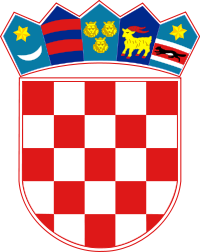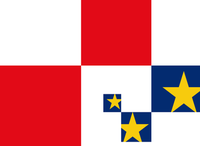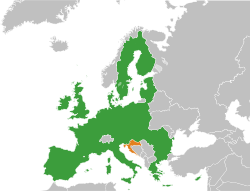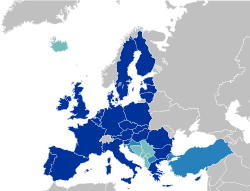Accession of Croatia to the European Union
|
|||||||||||||||||||||||||||||||||
Croatia applied for European Union membership in 2003, and the European Commission recommended making it an official candidate in early 2004. Candidate country status was granted to Croatia by the European Council in mid-2004. The entry negotiations, while originally set for March 2005, began in October that year together with the screening process.
The accession process of Croatia was derailed several times due to the Irish rejection of the Treaty of Lisbon in a referendum, and then later by the insistence of Slovenia that the two countries' border issues are dealt with prior to Croatia's accession into the EU.
Despite the logistical problems, the accession of Croatia is strongly supported by current EU member states.
Contents |
Issues of dispute
| Croatia |
 This article is part of the series: |
|
|
|
Constitution
Legislative
Judiciary
Executive
Political parties
Elections
Divisions
Foreign relations
|
|
Other countries · Atlas |
ICTY cooperation

Croatia has had to extradite several of its citizens to the International Criminal Tribunal for the Former Yugoslavia (ICTY), an issue that was often contentious in domestic politics.
Croatia's relations with the court had continuously been cited by the EU officials as something that required further improvement. Ratification of the EU Stabilisation and Association Agreement with Croatia had been stalled because of this.
The European Council, after its summit of 20 December 2004, set the following 17 March as the date to start entry negotiations, provided that Croatia continued to cooperate fully with the ICTY. On 16 March 2005 – the day before talks were to begin – the EU postponed the commencement of negotiations, because the ICTY prosecution assessed the Croatian efforts to capture the fugitive general Ante Gotovina (indicted by the ICTY for war crimes and crimes against humanity, but at large since 2001) as neither timely nor sufficient.
On 7 December 2005 Spanish Police finally arrested Ante Gotovina with the help of the Spanish and Croatian government on the Spanish island of Tenerife, located in the Canary Islands. He was brought to The Hague to be tried for war crimes. With the arrest of Ante Gotovina this issue seems to be now resolved, and entry negotiations have begun anew, after the certification of ICTY chief prosecutor Carla Del Ponte that Croatia now fully cooperates with the ICTY.
Border disagreements
Croatia must also contend with long-standing border issues with Slovenia. Good trade relations have precluded this up to December 2008 when Slovenia's blockade of Croatia's EU accession stalled the negotiating process for 10 months. In September 2009, it was announced that Slovenia would remove restraints on Croatia's negotiations with the EU without prejudice to the international mediation on the border dispute.[2] However, as of April 2010, Slovenia is still blocking opening of Chapter 31 (Foreign, Security & Defence Policy). As of June 2010, Slovenia has voted to accept the ruling of international arbitrators on the dispute, removing this obstacle.[3] Croatia has border disputes with Serbia, Bosnia & Herzegovina, and Montenegro, but these countries are not European Union members and cannot directly block the accession process. In December 2008 Croatia and Montenegro agreed that the outstanding sea border issue between the two countries should be settled before an international court whose decision would be accepted in advance by the parliaments of the two countries.[4]
Land ownership
Free acquisition of real estate by foreigners is a sensitive issue in Croatia. This matter particularly concerns Italians, especially in Istria. While it has strong cultural and historic ties with Italy, the events surrounding World War II, when Istria changed hands between the Kingdom of Italy and the Socialist Federal Republic of Yugoslavia, are more pertinent to the current issues. Numerous Italian politicians have expressed their discontent concerning the current inability of Italians to purchase land in Croatia, considering it discriminatory treatment, and stating that this issue should be resolved as soon as possible.
Croatia denies discrimination, indicating that Croatian legislation provides for the same treatment of all EU citizens concerning this issue. In mid-2006 Croatia and Italy agreed, and now Italian citizens may purchase land in Croatia, and Croatian citizens may purchase land in Italy. The same kind of measures, concerning this issue, have been employed by many new EU member countries before their own accession to the EU. Examples of this include Slovenia, Slovakia, Poland, and especially Malta.
Negotiation progress
| Acquis chapter | Current situation | Screening Started | Screening Completed | Chapter Frozen | Chapter Unfrozen | Chapter Opened | Chapter Closed |
|---|---|---|---|---|---|---|---|
| 1. Free Movement of Goods | Generally aligned with the acquis | 16.1.2006 | 24.2.2006 | - | - | 25.7.2008 | 19.4.2010 |
| 2. Freedom of Movement For Workers | Generally aligned with the acquis | 19.7.2006 | 11.9.2006 | - | - | 17.6.2008 | 2.10.2009 |
| 3. Right of Establishment & Freedom To Provide Services | Generally aligned with the acquis | 21.11.2005 | 20.12.2005 | - | - | 26.6.2007 | 21.12.2009 |
| 4. Free Movement of Capital | Further efforts needed | 25.11.2005 | 22.12.2005 | 12.2008 | 10.2009 | 2.10.2009 | - |
| 5. Public Procurement | Generally aligned with the acquis | 7.11.2005 | 28.11.2005 | - | - | 19.12.2008 | 30.6.2010 |
| 6. Company Law | Generally aligned with the acquis | 21.6.2006 | 20.7.2006 | 12.2008 | 10.2009 | 26.6.2007 | 2.10.2009 |
| 7. Intellectual Property Law | Generally aligned with the acquis | 6.2.2006 | 3.3.2006 | - | - | 29.3.2007 | 19.12.2008 |
| 8. Competition Policy | Considerable efforts needed | 8.11.2005 | 2.12.2005 | - | - | 30.6.2010 | - |
| 9. Financial Services | Generally aligned with the acquis | 29.3.2006 | 3.5.2006 | - | - | 26.6.2007 | 27.11.2009 |
| 10. Information Society & Media | Generally aligned with the acquis | 12.6.2006 | 14.7.2006 | - | - | 26.7.2007 | 19.12.2008 |
| 11. Agriculture & Rural Development | Considerable efforts needed | 5.12.2005 | 26.1.2006 | 12.2008 | 10.2009 | 2.10.2009 | - |
| 12. Food Safety, Veterinary & Phytosanitary Policy | Generally aligned with the acquis | 9.3.2006 | 28.4.2006 | 12.2008 | 10.2009 | 2.10.2009 | 27.7.2010[5] |
| 13. Fisheries | Further efforts needed | 24.2.2006 | 31.3.2006 | 12.2008 | 2.2010 | 19.2.2010 | - |
| 14. Transport Policy | Generally aligned with the acquis | 26.6.2006 | 28.9.2006 | - | - | 21.4.2008 | - |
| 15. Energy | Generally aligned with the acquis | 15.5.2006 | 16.6.2006 | - | - | 21.4.2008 | 27.11.2009 |
| 16. Taxation | Generally aligned with the acquis | 6.6.2006 | 12.7.2006 | 12.2008 | 10.2009 | 2.10.2009 | 30.6.2010 |
| 17. Economic & Monetary Policy | Generally aligned with the acquis | 16.2.2006 | 23.3.2006 | - | - | 21.12.2006 | 19.12.2008 |
| 18. Statistics | Generally aligned with the acquis | 19.6.2006 | 18.7.2006 | 12.2008 | 10.2009 | 26.6.2007 | 2.10.2009 |
| 19. Social Policy & Employment | Generally aligned with the acquis | 8.2.2006 | 22.3.2006 | - | - | 17.6.2008 | 21.12.2009 |
| 20. Enterprise & Industrial Policy | Generally aligned with the acquis | 27.3.2006 | 5.5.2006 | - | - | 21.12.2006 | 25.7.2008 |
| 21. Trans-European Networks | Generally aligned with the acquis | 30.6.2006 | 29.9.2006 | 12.2008 | 10.2009 | 19.12.2007 | 2.10.2009 |
| 22. Regional Policy & Coordination of Structural Instruments | Considerable efforts needed | 11.9.2006 | 10.10.2006 | 12.2008 | 10.2009 | 2.10.2009 | - |
| 23. Judiciary & Fundamental Rights | Considerable efforts needed | 6.9.2006 | 13.10.2006 | - | - | 30.6.2010 | - |
| 24. Justice, Freedom & Security | Considerable efforts needed | 23.1.2006 | 15.2.2006 | 12.2008 | 10.2009 | 2.10.2009 | - |
| 25. Science & Research | Generally aligned with the acquis | 20.10.2005 | 14.11.2005 | - | - | 12.6.2006 | 12.6.2006 |
| 26. Education & Culture | Generally aligned with the acquis | 26.10.2005 | 16.11.2005 | - | - | 11.12.2006 | 11.12.2006 |
| 27. Environment | Further efforts needed | 3.4.2006 | 2.6.2006 | 12.2008 | 2.2010 | 19.2.2010 | - |
| 28. Consumer & Health Protection | Generally aligned with the acquis | 8.6.2006 | 11.7.2006 | - | - | 12.10.2007 | 27.11.2009 |
| 29. Customs Union | Generally aligned with the acquis | 31.1.2006 | 14.3.2006 | 12.2008 | 10.2009 | 21.12.2006 | 2.10.2009 |
| 30. External Relations | Generally aligned with the acquis | 10.7.2006 | 13.9.2006 | - | - | 12.10.2007 | 30.10.2008 |
| 31. Foreign, Security & Defence Policy | Generally aligned with the acquis | 14.9.2006 | 6.10.2006 | 12.2008 | 4.2010 | 30.6.2010 | - |
| 32. Financial Control | Generally aligned with the acquis | 18.5.2006 | 30.6.2006 | - | - | 26.6.2007 | 27.7.2010[5] |
| 33. Financial & Budgetary Provisions | Generally aligned with the acquis | 6.9.2006 | 4.10.2006 | - | - | 19.12.2007 | - |
| 34. Institutions | Nothing to adopt | - | - | - | - | - | - |
| 35. Other Issues | Nothing to adopt | - | - | - | - | - | - |
| Progress | 33 out of 33[6] | 22 out of 33[6] |
Timeline
| Date | Event |
|---|---|
| 4 March 1998 | Ministry of European Integration formed within the Croatian Government.[7] |
| 29 October 2001 | Croatia signs the Stabilisation and Association Agreement. |
| 21 February 2003 | Formal application for membership submitted. |
| 9 October 2003 | Croatia submits answers to the Commission's Questionnaire. |
| 20 April 2004 | European Commission replies to the answers with a positive opinion (Avis). |
| 18 June 2004 | Croatia receives official candidate status. |
| 20 December 2004 | European Council sets the date for the entry negotiations to begin 17 March 2005. |
| 1 February 2005 | SAA comes into force. |
| 16 March 2005 | Negotiations postponed. |
| 3 October 2005 | The beginning of negotiations. |
| 20 October 2005 | Beginning of the screening process. |
| 12 June 2006 | 1 chapter is opened & closed: Science & Research. |
| 28 June 2006 | 2 chapters are opened: Competition Policy & Customs Union. |
| 20 July 2006 | 1 chapter is opened: Social Policy & Employment. |
| 11 December 2006 | 1 chapter is opened & closed: Education & Culture. |
| 29 March 2007 | 1 chapter is opened: Intellectual Property Law. |
| 26 June 2007 | 6 chapters are opened: Company Law, Financial Control, Financial Services, Information Society & Media, Right of Establishment & Freedom To Provide Services, and Statistics. |
| 12 October 2007 | 2 chapters are opened: Consumer & Health Protection and External Relations. |
| 20 December 2007 | 2 chapters are opened: Trans-European Networks and Financial & Budgetary Provisions. |
| 21 April 2008 | 2 chapters are opened: Energy & Transport Policy. |
| 17 June 2008 | 2 chapters are opened: Freedom of Movement For Workers and Social Policy & Employment. |
| 25 July 2008 | 1 chapter is opened: Free Movement of Goods. 1 chapter is closed: Enterprise & Industrial Policy. |
| 30 October 2008 | 1 chapter is closed: External Relations. |
| 19 December 2008 | 1 chapter is opened: Public Procurement. 3 chapters are closed: Economic & Monetary Policy, Information Society & Media, and Intellectual Property Law. |
| 23 April 2009 | EU calls off talks with Croatia due to the latter having a border dispute with Slovenia over the Bay of Piran. |
| 11 September 2009 | Slovenia agrees on an immediate ending of its blockade of Croatia's EU accession & further negotiation of the Gulf of Piran border dispute between the 2 countries. |
| 2 October 2009 | Croatia closed 5 chapters & opened 6. Chapters that were closed: Company Law, Customs Union, Freedom of Movement of Workers, Statistics, and Trans-European Networks. |
| 27 November 2009 | 3 chapters are closed: Consumer & Health Protection, Energy, and Financial Services. |
| 21 December 2009 | 2 chapters are closed: Right of Establishment & Freedom To Provide Services and Social Policy & Employment. |
| 19 February 2010 | 2 chapters are opened: Environment & Fisheries. |
| 19 April 2010 | 1 chapter is closed: Free Movement of Goods |
| 30 June 2010 | 2 chapters are closed: Taxation and Public Procurement. 3 chapters are opened: Foreign, Security & Defence Policy, Judiciary & Fundamental Rights and Competition Policy. |
| 27 July 2010 | 2 chapters are closed: Food Safety, Veterinary & Phytosanitary Policy and Financial Control |
Possible accession dates
Originally, Croatia had been aiming for a 2007 accession date—such an accomplishment would have broken Slovakia's record of 2.5 years of negotiations to complete the process. It has been remarked by former-Enlargement Commissioner Olli Rehn that the EU does expect a similar speed from Croatia.
On 25 April 2007, the European Parliament congratulated Croatia for making "rapid progress" towards membership, but stated that "it must make further efforts in areas such as cooperation with the ICTY, reform of the judiciary and the transition to a market economy".[8] Leaders and Members of the European Parliament also stressed the need for a new institutional framework (fulfilled by the Treaty of Lisbon) for the EU by 2008 in order to accommodate Croatia, although it would be the next country to join with Lisbon in force.[9][10]
On 5 November 2008, the European Commission's annual progress report on Croatia's candidacy was published. Rehn stated that the country should complete accession negotiations by the end of 2009, with membership following by 2011 at the latest.[11] In 2009 it was reported that Iceland may be fast-tracked into the European Union.[12] Rehn said that "the EU prefers two countries joining at the same time rather than individually. If Iceland applies shortly and the negotiations are rapid, Croatia and Iceland could join the EU in parallel," probably in 2011. The last non-acquis hurdle to membership, the maritime border dispute with Slovenia, was overcome in November 2009. Croatia hopes to finish negotiations in 2010 although in April 2010 diplomats warned it would probably miss that goal, in part due to tougher EU rules.[13]
See also
- Slovenia’s blockade of Croatia’s EU accession
- Foreign relations of Croatia
- Enlargement of the European Union
References
- ↑ 1.0 1.1 "Negotiations Chapters". Delegation of the European Union to the Republic of Croatia. http://www.delhrv.ec.europa.eu/?lang=en&content=67. Retrieved 2010-04-19.
- ↑ "Slovenia unblocks Croatian EU bid". BBC News. 11 September 2009. http://news.bbc.co.uk/1/hi/world/europe/8250441.stm. Retrieved 2009-09-12.
- ↑ "Slovenia backs Croatia border deal in referendum vote". BBC News. 06 June 2010. http://news.bbc.co.uk/1/hi/world/europe/10248037.stm. Retrieved 2010-06-07.
- ↑ "Croatia, Montenegro agree sea border issue should be settled before international court". Government of Croatia. March 12, 2008. http://www.vlada.hr/en/naslovnica/novosti_i_najave/2008/ozujak/predsjednik_vlade_s_predsjednikom_vlade_crne_gore. Retrieved 2009-12-27.
- ↑ 5.0 5.1 http://www.croatiantimes.com/news/General_News/2010-07-27/12584/Croatia_closes_another_two_EU_chapters
- ↑ 6.0 6.1 Excluding Chapters 34 (Institutions) and 35 (Other Issues) since these are not legislation chapters.
- ↑ "Vlada: 6 / predsjednik Vlade: Mr. sc. Zlatko Mateša". Hidran.hidra.hr. http://hidran.hidra.hr/hidrarad/rh/rh66.htm. Retrieved 2010-06-11.
- ↑ European Parliament, Croatia: Good progress towards accession and some issues remain, 25 April 2007. Retrieved 27 April 2007.
- ↑ "Croatia could conclude EU talks in 2009 - Austria and Czech premiers". Forbes.com. http://www.forbes.com/markets/feeds/afx/2008/01/07/afx4501933.html. Retrieved 2010-06-11.
- ↑ Euractiv.com - Croatia will not join EU before 2010 - accessed on June 12, 2006.
- ↑ Traynor, Ian (2008-11-05). "Croatia given timetable for EU entry". The Guardian (London). http://www.guardian.co.uk/world/2008/nov/05/croatia-eu. Retrieved 2008-11-05.
- ↑ Traynor, Ian (2009-01-30). "Iceland to be fast-tracked into the EU". The Guardian (London). http://www.guardian.co.uk/world/2009/jan/30/iceland-join-eu. Retrieved 2009-01-30.
- ↑ Augustin Palokaj (1990-03-26). "/ Croatia likely to miss 2010 target". Waz.euobserver.com. http://waz.euobserver.com/887/29989. Retrieved 2010-06-11.
Further reading
- Jović, Dejan (April 2006). "Croatia and the European Union: a long delayed journey". Journal of Southern Europe and the Balkans 8 (1): 85–103. doi:10.1080/14613190600595598. http://www.ingentaconnect.com/content/routledg/cjsb/2006/00000008/00000001/art00006.
External links
- Official website - Negotiations for the Accession of the Republic of Croatia to the European Union
- Official EU-website concerning enlargement
- BBC News: inside Europe: EU enlargement
|
||||||||||||||||||||||||||||||||||||||||||||||||||||||||||||||||||||||||||
|
|||||||||||||||||
|
||||||||||||||||||||


